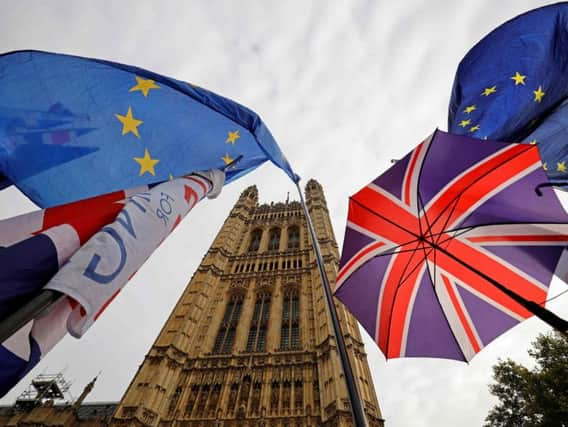Brexit: MSPs told EU would take London's lead in recognising an independent Scotland


Holyrood's Europe committee was told that while there was "goodwill" towards Scotland within the EU, if it were to become independent, it would need to do so "in co-operation with Westminster" to be legally recognised.
MSPs were taking evidence on the EU Withdrawal Bill from experts, including former UK diplomat Dame Mariot Leslie, Kings College Professor of European Politics and Foreign Affairs, Anand Menon and Dr Fabian Zuleeg, chief executive of the European Policy Centre.
Advertisement
Hide AdAdvertisement
Hide AdDame Mariot, who also sits on the First Ministers’ Standing Council on Europe, said: "The reality is that no other country would recognise an independent Scotland until London had recognised it - then there would be a rapid queue of European Union countries, and countries beyond the EU who would do so.
"But I can't see any country we would wish to be recognised by jumping that gun until London had recognised an independent Scotland. However, what I do think two things have changed since 2014 - there's a more benign attitude to Scotland within the EU because of the approach over Brexit, and because the UK itself would no longer be inside the EU, so not wishing to tread on the toes of an existing member state would no longer be an issue with the rest of the 27."
Charles Grant, director of the Centre for European Reform said the key thing for the EU was "the question of legality."
He said: "The reason the EU has not taken Catalonia's side in recent years is because the Catalans are pursuing a course of action the EU perceives as illegal. So long as Scotland moves towards independence according to the constitution and in co-operation with Westminster, I think the EU would look benignly on Scottish independence.
"The Spanish have shifted their line from being totally hostile to Scottish independence to not necessarily hostile, so if Scotland pursues a law-abiding route to that end, Scotland would be welcome in the EU."
"Some people draw the analogy because they've made these special provisions for Northern Ireland - watered down the indivisibility of the free market, a degree of ambiguity around the Northern Ireland deal - but there are specific reasons for that, not least the EU's role in Good Friday Agreement, and the fact that the vital interest of an existing member state were engaged... so I wouldn't assume the level of flexibility shown there would be shown to Scotland in future."
MSPs were told by Dr Zuleeg that while Scotland was part of the UK the "goodwill" in Europe would "not make much of a material difference."
"Scotland will leave, together with rest of UK, and will not have a particular role within the negotiations unless the UK government chooses to emphasis particular issues of importance to Scotland.
Advertisement
Hide AdAdvertisement
Hide Ad"When it comes to the question of independence, that's a different debate. I would not expect that the EU will engage in that debate unless it becomes more concrete than it is at the moment. Yes, there's sympathies for the position Scotland finds itself in but there would be practical questions raised and I wouldn't expect the EU to engage with that unless it becomes a real possibility."
"We will no longer have Scottish members of the European Parliament making the case there," she said. "The Scottish Government will continue I'm sure to engage as much as it can with the EU, and with EU institutions, civil society. universities and so on and a lot of Scottish civic organisations will continue to do that, and ought to be encouraged to do that, but Scotland will not have much purchase under current arrangements.
"Scotland should be thinking hard about the areas where they... would want to proactively pursue contacts, or they will simply wither."
"Within the political declaration there's a paragraph on structures talking about both parties encouraging contacts and dialogue between the EU and Westminster parliaments, there's no mention of devolved parliaments in that, but given that the future arrangement will involve devolved matters, which is also true of Wales and Northern Ireland, it seems to me worth considering how this parliament is going to pursue future relationships with the European Parliament."
